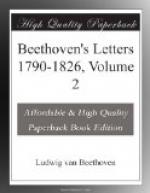Lichnowsky, Prince Carl, a friend and pupil of Mozart, and afterwards a most zealous patron of Beethoven in Vienna (died April 15, 1814).
Liechtenstein, Princess, in Vienna, Beethoven’s patroness.
Linke, born 1783, a distinguished violoncello player,
member of the
Rasumowsky Quartets.
Lobkowitz, Prince, one of Beethoven’s most zealous patrons in Vienna.
London, England, and the English.
Luther.
Maelzel, mechanician to the Imperial Court of Vienna, the well-known inventor of the metronome.
Malchus, a youthful friend of Beethoven in Bonn, in later years Minister of Finance of the kingdom of Westphalia, and afterwards of that of Wirtemberg (died at Stuttgart in 1840).
Malfatti, Dr., a celebrated surgeon in Vienna; Beethoven under his treatment in 1814.
Marconi, contralto singer in Vienna.
Marx, A.B., music director and professor at the University of Berlin; edited, when in his twentieth year, the “Berliner Musikzeitung,” a journal whose publication, unfortunately, lasted but a few years only. Next to T.A. Hofmann, he was the first who fully and thoroughly appreciated Beethoven’s music in all its depth and grandeur, and who manfully and intelligently defended the lofty genius of the master against the base attacks to which it was at times exposed; he has remained until the present day the most efficient representative of the progress of musical art.
Matthisson, the poet.
Maximilian Franz, youngest brother of the Emperor Joseph II., Elector of Cologne from the year 1785, and one of the noblest and most zealous patrons of the young Beethoven, on whom, in 1785, he conferred the appointment of Court organist, and in 1787, with a view to the further cultivation of his talents, sent him to Vienna, assisting him in every way until the year 1794, at which period his country fell entirely under the dominion of France (died in 1801).
Maximilian, Friedrich, Elector of Cologne until the year 1784; the first noble patron of Beethoven, whom he placed under the instruction of the Court organist Von der Eeden, and afterwards, on the death of that musician, under Neefe; as an acknowledgment for which kindness, and in proof of the success which had attended his studies, the young composer, then only eleven years of age, dedicated his first sonatas to his benefactor.
Mayseder, the celebrated violinist (died at Vienna in 1863).
Meyer, Friedrich Sebastian, a singer (born 1773, died 1835), the husband of Mozart’s eldest sister-in-law, who frequently, even in Beethoven’s presence, made some boastful remark in praise of his deceased relative; such as “My brother-in-law would not have written that!”
Metronome, an instrument for measuring tune in music, invented about the year 1815 by Maelzel, of Vienna, and often employed and spoken of by Beethoven.
Milder-Hauptmann, Mdlle., the celebrated singer, first in Vienna and afterwards in Berlin.




